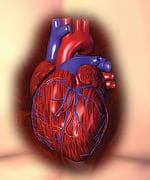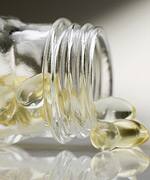Life Extension Magazine®
Heartburn Drugs Tied to Greater Fracture Risk | |
| When used for a year or longer, heavily prescribed heartburn medications such as Nexium®, Prevacid®, and Prilosec® substantially raise the risk of hip fracture among older adults, according to a study recently reported in the Journal of the American Medical Association.* While these medications, classified as proton-pump inhibitors, reduce stomach acid, they presumably also decrease the stomach’s ability to absorb calcium, which is essential for maintaining healthy bones. The study found a 44% higher risk of hip fractures among people 50 and older who took one of the drugs for at least a year, with higher doses correlated with higher risk. The study indicated that another class of prescription antacids, known as H2-blockers (such as Tagamet® or Pepcid®) also increase hip fracture risk, albeit to a lesser extent than proton pump inhibitors. Over-the-counter antacids such as Tums®, Rolaids®, and Maalox® have not been shown to interfere with calcium absorption. —Dale Kiefer | |
| Reference | |
| * Yang YX, Lewis JD, Epstein S, Metz DC. Long-term proton pump inhibitor therapy and risk of hip fracture. JAMA. 2006 Dec 27;296(24):2947-53. | |
Hydroxycitric Acid Supports Weight-Loss Efforts | |
Hydroxycitric acid helps support weight-management efforts in obese adults, report Georgetown University researchers.* In a trial of 90 obese adults, one group took a daily dose of hydroxycitric acid, a second group received hydroxycitric acid in combination with niacin-bound chromium and Gymnema sylvestre extract, and a third group took a placebo. All three groups consumed the same diet and participated in a 30-minute walking program five days a week. After eight weeks, the hydroxycitric acid group reduced their body weight by 5.4%, their triglycerides by 6.9 %, and their low-density lipoprotein (LDL) by 12.9%, while increasing beneficial high-density lipoprotein (HDL) by 8.9%. Urinary excretion of fat metabolites increased by 32-109%. The hydroxycitric acid-chromium-Gymnema extract group demonstrated similar but even more pronounced effects. Hydroxycitric acid—used along or in combination with niacin-bound chromium and Gymnema extract—thus helps to reduce body weight, improve blood lipid profiles, and increase fat oxidation. —Elizabeth Wagner, ND | |
| Reference | |
| * Preuss HG, Garis RI, Bramble JD, et al. Efficacy of a novel calcium/potassium salt of (-)-hydroxycitric acid in weight control. Int J Clin Pharmacol Res. 2005;25(3):133-44. | |
Selenium May Slow HIV Progression | |
Consuming a daily selenium supplement is associated with suppression of the HIV virus and improved immune function, report scientists writing in the Archives of Internal Medicine.* Two hundred sixty-two HIV-positive men and women were randomly assigned to receive a placebo or 200 mcg daily of supplemental selenium. Blood selenium levels, CD4 count (a measure of immune function), and HIV viral load (the number of copies of the virus in the blood) were assessed at the study’s beginning and end. Greater selenium levels predicted a decline in HIV viral load, which subsequently predicted increased CD4 counts, which are associated with a lower risk of secondary infections. “Our results support the use of selenium as a simple, inexpensive, and safe adjunct therapy” in treating HIV, the scientists concluded. —Dayna Dye | |
| Reference | |
| * Hurwitz BE, Klaus JR, Llabre MM, et al. Suppression of human immunodeficiency virus type 1 viral load with selenium supplementation: a randomized controlled trial. Arch Intern Med. 2007 Jan 22;167(2):148-54. | |
Supplement Lowers Weight, Cholesterol in Kids | |
| Supplementing with vitamins, minerals, and fiber helps overweight children lose weight, according to a recent study.* Twenty-five mildly to moderately obese boys and girls, aged 7-13, took one multivitamin-mineral tablet at breakfast, and two mixed fiber capsules with water 15 minutes before lunch and dinner. At the study’s onset and conclusion, investigators measured the children’s body weight, body fat percentage, waist circumference, total cholesterol, and triglycerides. Six weeks of supplementation produced statistically significant weight loss and a decrease in body fat percentage. The children’s cholesterol and triglyceride levels also declined markedly, while waist circumference decreased modestly. The scientists concluded that a combination of vitamins, minerals, and fiber is a safe, effective way to help overweight children reduce their weight, body fat percentage, and cholesterol and triglyceride levels. —Elizabeth Wagner, ND | |
| Reference | |
| * Gonzalez MJ, Miranda-Massari JR, Ricart CM, Guzman AM. Effect of a dietary supplement combination on weight management, adipose tissue, cholesterol and triglycerides in obese children. PR Health Sci J. 2005 Sep;24(3):211-3. | |
Fish Oil May Improve Coordination in Infants | |
Children born to pregnant women who consumed fish oil supplements had better hand-eye coordination than those born to mothers who did not consume fish oil, according to new findings.* In a double-blind trial, 98 pregnant women supplemented with 4 grams of fish oil (yielding 2.2 grams of DHA and 1.1 grams of EPA) or 4 grams of olive oil from the twentieth week of pregnancy until birth. The children were tested for language, behavior, practical reasoning, and hand-eye coordination at the age of 30 months. Those whose mothers took fish oil scored higher on measures of language comprehension, average phrase length, and vocabulary. Hand-eye coordination skills were significantly greater among the children of mothers who were given fish oil. “Maternal fish oil supplementation during pregnancy is safe for the fetus and infant, and may have potentially beneficial effects on the child’s eye and hand coordination,” the authors concluded. —Dayna Dye | |
| Reference | |
| * Dunstan JA, Simmer K, Dixon G, Prescott SL. Cognitive assessment at 21/2 years following fish oil supplementation in pregnancy: a randomized controlled trial. Arch Dis Child Fetal Neonatal Ed. 2006 Dec 21; [Epub ahead of print] | |
Life Extension Green Tea Extract Guards Against Neurodegeneration | |
Life Extension’s green tea extract protects the brain against oxidative stress and degeneration, report scientists from Italy and China.* The researchers, who have no financial ties to Life Extension, will present their findings at an upcoming meeting of the International Association of Biomedical Gerontology in Greece. Stress and aging contribute to neurodegenerative disorders. To assess the potential neuroprotective effect of green tea extract, the researchers exposed aged rats to stress for four hours daily. One group received a single dose of caffeine-free green tea extract (equal to 250 mg per kilogram of body weight) each day following the stressful stimulus, while a second group did not receive green tea. After 30 days, the stressed animals exhibited substantial neurodegeneration of the hippocampus (a brain area associated with memory that deteriorates in Alzheimer’s disease), along with increased markers of oxidative stress and depleted levels of essential antioxidants. By contrast, rats that received green tea extract were protected against stress-induced neurodegeneration. Green tea extract improved or normalized brain cell count in the hippocampus, while preventing much of the oxidative stress and antioxidant depletion associated with the stressful stimulus. These remarkable findings demonstrate that a potent green tea extract helps protect against stress-induced neurodegeneration. Editor’s note: This experiment utilized Life Extension’s Super Green Tea Extract. —Elizabeth Wagner, ND | |
| Reference | |
| * Marotta F, Chui DH, Lorenzetti A, Liu T, Marandola P. Green tea mitigates stress-induced hippocampal neuronal oxidative stress and degeneration in old rats. Poster to be presented at: “Molecular Mechanisms and Models of Ageing”: 12th Congress of the International Association of Biomedical Gerontology meeting; May 20-24, 2007; Spetses Island,Greece. | |
Weight Loss Cuts Prostate Cancer Risk | |
| Even modest weight loss reduces prostate cancer risk, report researchers from the American Cancer Society.* In a study of nearly 70,000 men, those who lost 11 pounds or more over the course of a decade reduced their risk of being diagnosed with aggressive prostate cancer by approximately 40% compared to men whose weight remained unchanged. The subjects were followed for more than 20 years. While scientists have previously shown that obesity increases the risk of prostate cancer, this study is thought to be the first to clearly demonstrate that weight loss has the opposite effect. —Dale Kiefer | |
| Reference | |
| * Rodriguez C, Freedland SJ, Deka A, et al. Body mass index, weight change, and risk of prostate cancer in the Cancer Prevention Study II Nutrition Cohort. Cancer Epidemiol Biomarkers Prev. 2007 Jan;16(1):63-9. | |
Calcium, Vitamin D Improve Lipid Profiles | |
Women who supplement their weight-loss program with calcium and vitamin D achieve better lipid profiles than those who do not, according to a just-published report.* During a 15-week trial, 63 overweight or obese women supplemented twice daily with 600 mg of calcium and 200 IU of vitamin D, or an inactive placebo. Compared to the placebo group, those who took the calcium-vitamin D supplement significantly reduced their low-density lipoprotein (LDL), total cholesterol to high-density lipoprotein (HDL) ratio, and LDL to HDL ratio, while also lowering their total cholesterol and triglycerides. Supplementation with calcium and vitamin D thus augmented the beneficial effects of weight loss on lipid and lipoprotein profiles in overweight and obese women. —Dayna Dye | |
| Reference | |
| * Major GC, Alarie F, Dore J, Phouttama S, Tremblay A. Supplementation with calcium + vitamin D enhances the beneficial effect of weight loss on plasma lipid and lipoprotein concentrations. Am J Clin Nutr. 2007 Jan;85(1):54-9. |











